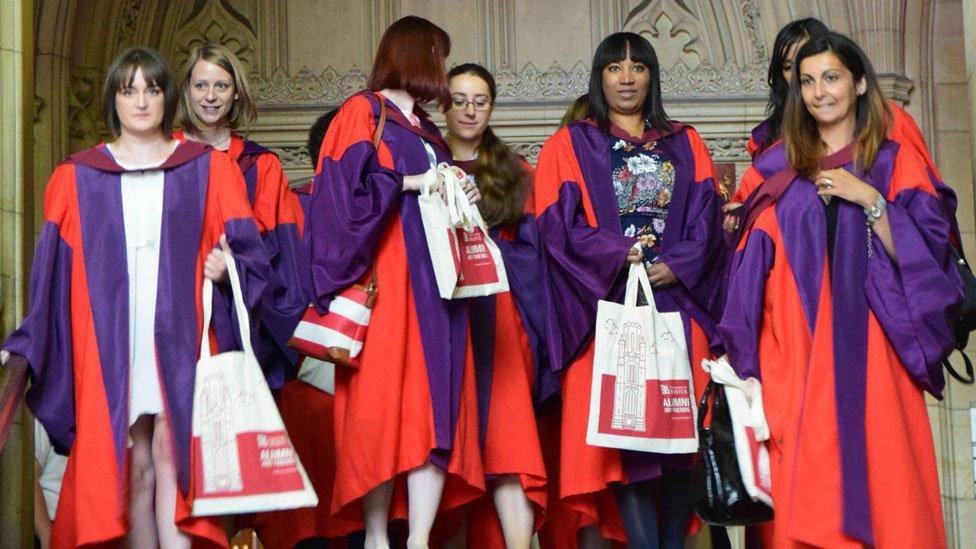Rise in poorer students dropping out of university
- Published

Rising numbers of students from more disadvantaged homes are dropping out of universities in England before completing their studies, figures show.
The proportion of youngsters from disadvantaged families who do not continue after their first year has reached the highest level for five years, says the Office for Fair Access.
Official data shows that in 2014-15, 8.8% of young, full-time, disadvantaged undergraduates did not continue in higher education beyond their first year - up from 8.2% the year before.
By comparison, in 2014-15, less than 5% of those from the wealthiest backgrounds did not continue their studies.

Have you dropped out of studying at university? Why did you leave? Email us at haveyoursay@bbc.co.uk, external

The Offa report says: "The gap between the non-continuation rates of the most advantaged and most disadvantaged students has widened in the past year.
"While more disadvantaged young people are in higher education than ever before, the numbers of those students leaving before completing their studies has risen for the second year in a row."
The report says: "The significance of this for students is huge.
"Higher education can be a transformational experience that opens doors to rewarding careers and social mobility, but this is only the case if students achieve successful outcomes."
Black students
The report also finds the non-continuation rate for black students is almost 1.5 times higher than it is for white and Asian students.
"For black students who complete their degree, the level of attainment is also markedly different: while 76% of white students graduated with a 'good degree' (first or 2:1), only 52% of black students did the same," the report says.

Offa also wants universities to do more to address the needs of part-time students, saying targets focused on mature entrants were the most frequently missed.
"The steep decline in part-time numbers has had severely negative implications for mature numbers, as 93% of part-time learners are mature," the report says.
"The fall in part-time entrants for a seventh consecutive year has meant an overall decline of 58% since 2010-11. Immediate action is required in this area."
The Offa report also assesses the progress universities and degree-awarding colleges have made in widening participation - encouraging more disadvantaged youngsters to study for a degree - against the commitments and targets institutions made in their 2015-16 "access agreements".
Institutions wishing to charge higher tuition fees, up to a maximum of £9,250, must sign an "access agreement" with Offa.
And the report finds that universities are spending more cash on schemes to encourage those from less advantaged homes.
Overall in 2015-16, the total investment in widening participation activity by all higher education providers was £883.5m, up from £842.1m in 2014-15 and £802.6m in 2013-14.
Social mobility
Universities Minister Jo Johnson said there was "still more work to do to ensure no student is missing out".
"The Higher Education and Research Act will build on this progress by requiring providers, including the most selective institutions, to publish application, dropout and attainment data broken down by gender, ethnicity and socio-economic background, holding them to account for their performance and helping students to make informed choices about where they go to study."
Sarah Stevens, head of policy at the Russell Group, said its universities were "investing significantly in widening access, nearly doubling funding over the last five years for scholarships, fee waivers, bursaries and outreach activities aimed at the most disadvantaged".
"The Social Mobility Commission's report this week made it clear that the UK still has a long way to go to ensure that people from all walks of life have the same opportunities to succeed," she said.
"Our members work to ensure more young people apply to leading universities, and more students from disadvantaged backgrounds graduate with qualifications and skills that help them into the workforce."
James Westhead, executive director at Teach First, said: "We know there are significant social mobility hurdles that poorer children are forced to clear that their wealthier peers simply don't have to deal with.
"The government, universities, schools and society as a whole must work together to challenge this, raise attainment and realise the aspirations of all our young people."
- Published15 December 2016
